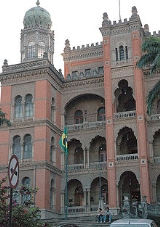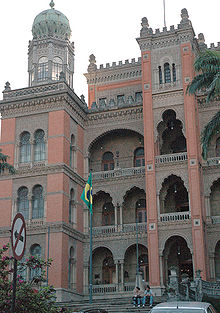
Instituto Oswaldo Cruz
Encyclopedia

Portuguese language
Portuguese is a Romance language that arose in the medieval Kingdom of Galicia, nowadays Galicia and Northern Portugal. The southern part of the Kingdom of Galicia became independent as the County of Portugal in 1095...
Fundação Oswaldo Cruz, also known as FIOCRUZ) is a scientific institution for research and development in biomedical sciences located in Rio de Janeiro
Rio de Janeiro
Rio de Janeiro , commonly referred to simply as Rio, is the capital city of the State of Rio de Janeiro, the second largest city of Brazil, and the third largest metropolitan area and agglomeration in South America, boasting approximately 6.3 million people within the city proper, making it the 6th...
, Brazil
Brazil
Brazil , officially the Federative Republic of Brazil , is the largest country in South America. It is the world's fifth largest country, both by geographical area and by population with over 192 million people...
, it is considered one of the world's main public health
Public health
Public health is "the science and art of preventing disease, prolonging life and promoting health through the organized efforts and informed choices of society, organizations, public and private, communities and individuals" . It is concerned with threats to health based on population health...
research institutions. It was founded by Dr. Oswaldo Cruz
Oswaldo Cruz
Oswaldo Gonçalves Cruz, better known as Oswaldo Cruz |São Paulo]] state, Brazil – February 11, 1917, Petrópolis, Rio de Janeiro state) was a Brazilian physician, bacteriologist, epidemiologist and public health officer and the founder of the Oswaldo Cruz Institute.He also occupied the 5th chair of...
, a noted physician and epidemiologist.
The Federal Serum Therapy Institute was established with the objective of developing serum and vaccines against the bubonic plague
Bubonic plague
Plague is a deadly infectious disease that is caused by the enterobacteria Yersinia pestis, named after the French-Swiss bacteriologist Alexandre Yersin. Primarily carried by rodents and spread to humans via fleas, the disease is notorious throughout history, due to the unrivaled scale of death...
. The institute’s activities, however, changed from simple production into research and experimental medicine, especially after Oswaldo Cruz assumed its leadership in 1902. From there on, the institute became the base for memorable sanitation campaigns in an age of outbreaks and epidemics of the bubonic plague
Bubonic plague
Plague is a deadly infectious disease that is caused by the enterobacteria Yersinia pestis, named after the French-Swiss bacteriologist Alexandre Yersin. Primarily carried by rodents and spread to humans via fleas, the disease is notorious throughout history, due to the unrivaled scale of death...
, yellow fever
Yellow fever
Yellow fever is an acute viral hemorrhagic disease. The virus is a 40 to 50 nm enveloped RNA virus with positive sense of the Flaviviridae family....
, and smallpox
Smallpox
Smallpox was an infectious disease unique to humans, caused by either of two virus variants, Variola major and Variola minor. The disease is also known by the Latin names Variola or Variola vera, which is a derivative of the Latin varius, meaning "spotted", or varus, meaning "pimple"...
.
The Institute, however, was not confined to Rio de Janeiro
Rio de Janeiro
Rio de Janeiro , commonly referred to simply as Rio, is the capital city of the State of Rio de Janeiro, the second largest city of Brazil, and the third largest metropolitan area and agglomeration in South America, boasting approximately 6.3 million people within the city proper, making it the 6th...
and, on the contrary, collaborated in the occupation of the country’s inlands through scientific expeditions, aiding in the development of the country.
When Oswaldo Cruz died, in 1917, the Institute, which by then already bore his name, was nationally consolidated through important scientific achievements, such as Carlos Chagas
Carlos Chagas
Carlos Justiniano Ribeiro Chagas, or Carlos Chagas , was a Brazilian sanitary physician, scientist and bacteriologist who worked as a clinician and researcher. He discovered Chagas disease, also called American trypanosomiasis in 1909, while working at the Oswaldo Cruz Institute in Rio de Janeiro...
’ description of the complete cycle of the American trypanosomiasis including the clinical pattern of the disease.
On 16 January 2007, the Institute announced that it had developed a gel from algae
Algae
Algae are a large and diverse group of simple, typically autotrophic organisms, ranging from unicellular to multicellular forms, such as the giant kelps that grow to 65 meters in length. They are photosynthetic like plants, and "simple" because their tissues are not organized into the many...
which it is hoped will reduce HIV
HIV
Human immunodeficiency virus is a lentivirus that causes acquired immunodeficiency syndrome , a condition in humans in which progressive failure of the immune system allows life-threatening opportunistic infections and cancers to thrive...
transmission to women.
Today the institution has a broad range of responsibilities related to the health and wellbeing of the Brazilian population. This includes hospital and ambulatory care; health-related research; development of vaccines, drugs, reagents, and diagnostic kits; training of public health and health workers; and providing information and communications related to health, science, and technology. The Fiocruz workforce numbers over 7,500. Fiocruz includes several fixed facilities in Rio de Janeiro and other locations; however, it contributes to improving health throughout the country, through its support to the Sistema Único de Saúde (Unified Health System, the Brazilian public health system), its proposals on public health policy-making, its research activities, its scientific expeditions, and the reach of its health services and products.
Fiocruz is one of the founding members of the International Association of National Public Health Institutes, a membership organization of national public health institutes
National public health institutes
National public health institutes are science-based governmental organizations that serve as a focal point for a country's public health efforts, as well as a critical component of global disease prevention and response systems...
.

